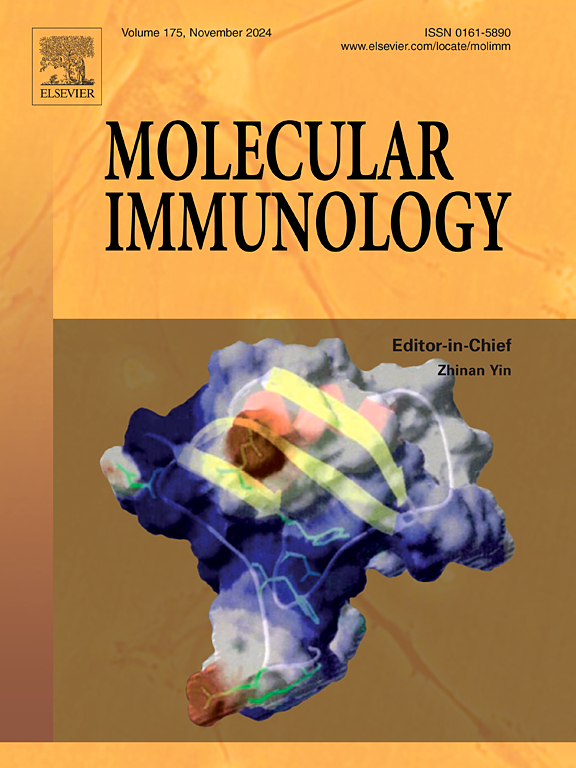Targeted p38 mitogen-activated protein kinase inhibition potently augment inflammatory responses of human macrophages toward Staphylococcus aureus
IF 3
3区 医学
Q2 BIOCHEMISTRY & MOLECULAR BIOLOGY
引用次数: 0
Abstract
Antibiotic-resistant Staphylococcus aureus (S. aureus) is a growing challenge for human health and novel treatment options are needed. Here we examine a novel therapeutic approach against persistent S. aureus infections based on monocyte/macrophage specific inhibition of the p38α mitogen-activated protein kinase activity. Since systemic p38α kinase inhibition cause aberrant toxicity, we used the myeloid specific p38α kinase inhibitor, MPL-5821. P38α kinase inhibition caused a potent increase in the pro-inflammatory profile of human macrophages after exposure to S. aureus, including upregulation of M1-markers and induction of pro-inflammatory cytokines including IFN-γ, TNF-α, IL-1β, IL12p70, IL-6 and IL-8, as well as an increase in phagocytic capacities. These pro-inflammatory signals were only seen after combined S. aureus exposure and p38α inhibition. Macrophages are often regulated by changes in intracellular metabolism. In agreement with this, the combination of S. aureus exposure and p38α inhibition led to specific changes in glycolytic and mitochondrial activity within the responding macrophages. Our study thus unravels a novel and specific activation of macrophages that augment their response toward S. aureus, without causing aberrant inflammation. This constitutes a unique non-antibiotic therapeutic approach that can potentially be used against persistent S. aureus infection.
靶向p38丝裂原活化蛋白激酶抑制可增强人巨噬细胞对金黄色葡萄球菌的炎症反应
耐抗生素金黄色葡萄球菌(金黄色葡萄球菌)是对人类健康日益严峻的挑战,需要新的治疗方案。在这里,我们研究了一种新的治疗方法,基于单核细胞/巨噬细胞特异性抑制p38α丝裂原激活的蛋白激酶活性,治疗持久性金黄色葡萄球菌感染。由于全身p38α激酶抑制引起异常毒性,我们使用髓系特异性p38α激酶抑制剂MPL-5821。P38α激酶抑制导致暴露于金黄色葡萄球菌后的人巨噬细胞的促炎谱明显增加,包括m1标记物的上调和促炎细胞因子(包括IFN-γ、TNF-α、IL-1β、il - 12p70、IL-6和IL-8)的诱导,以及吞噬能力的增加。这些促炎信号仅在金黄色葡萄球菌暴露和p38α抑制联合后才可见。巨噬细胞通常受细胞内代谢变化的调节。与此一致的是,金黄色葡萄球菌暴露和p38α抑制的结合导致应答巨噬细胞内糖酵解和线粒体活性的特异性变化。因此,我们的研究揭示了一种新的和特异性的巨噬细胞激活,增强了它们对金黄色葡萄球菌的反应,而不会引起异常炎症。这构成了一种独特的非抗生素治疗方法,可以潜在地用于对抗持续性金黄色葡萄球菌感染。
本文章由计算机程序翻译,如有差异,请以英文原文为准。
求助全文
约1分钟内获得全文
求助全文
来源期刊

Molecular immunology
医学-免疫学
CiteScore
6.90
自引率
2.80%
发文量
324
审稿时长
50 days
期刊介绍:
Molecular Immunology publishes original articles, reviews and commentaries on all areas of immunology, with a particular focus on description of cellular, biochemical or genetic mechanisms underlying immunological phenomena. Studies on all model organisms, from invertebrates to humans, are suitable. Examples include, but are not restricted to:
Infection, autoimmunity, transplantation, immunodeficiencies, inflammation and tumor immunology
Mechanisms of induction, regulation and termination of innate and adaptive immunity
Intercellular communication, cooperation and regulation
Intracellular mechanisms of immunity (endocytosis, protein trafficking, pathogen recognition, antigen presentation, etc)
Mechanisms of action of the cells and molecules of the immune system
Structural analysis
Development of the immune system
Comparative immunology and evolution of the immune system
"Omics" studies and bioinformatics
Vaccines, biotechnology and therapeutic manipulation of the immune system (therapeutic antibodies, cytokines, cellular therapies, etc)
Technical developments.
 求助内容:
求助内容: 应助结果提醒方式:
应助结果提醒方式:


